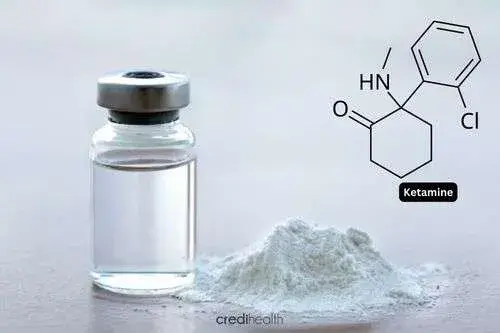The drug ketamine is quickly gaining popularity among young people in America. 1.3% of 12th graders were determined to have taken the substance illegally for recreational reasons in 2020, up from 0.7% the year before. Ketamine is well-known for its therapeutic benefits, but its effects have also made it a common addition to the party scene. Additionally, it is now classified as a date rape drug with Rohypnol (flunitrazepam) and GHB (gamma hydroxybutyrate). When taken alone, ketamine isn't the most lethal chemical, but being addicted to it can have a significant negative impact on one's quality of life. There are several techniques to detect someone's potential ketamine addiction. We'll look at warning signs to watch out for as well as potential risk factors for ketamine dependency or addiction. The article will examine "Is Ketamine Addictive?", what is ketamine, how can you identify if it is addictive, and how it affects you, if want to know more continue reading.
What is Ketamine?

Short-acting anesthetic Ketamine, sometimes referred to as Special K or Super K, has psychedelic properties. It can alter the way you perceive sights and sounds, give you a sense of helplessness, and make you feel removed from the surroundings and any discomfort you may be experiencing. Ketamine was developed by scientists to be both an anesthetic and a painkiller.
For these uses, the FDA has given it approval. However, this "club drug" is frequently abused.Researchers are currently examining if there could be some advantages in the struggle against addiction, nevertheless. In two clinical trials on the treatment of drug abuse, the use of ketamine in conjunction with behavioral and motivational therapy was associated with superior results.
Also Read: 5 Conditions Occupational Therapy Helps You With
What Are The Symptoms Of Ketamine Addiction?
Ketamine dependence can develop extremely fast in users. Due to a build-up of tolerance, higher doses of ketamine are needed to achieve the intended high. The following symptoms might be seen in someone who is ketamine-dependent:
- Autonomic aroused
- Chills
- Confusion
- Delusions
- Excessive slurring
- Low appetite
- Nightmares
- Paranoia
- Restlessness
- Seizures
- Shaking
- Sweating
- Tiredness
- Bruises that appear out of the blue when intoxicated.
- Moist eyes
People who become addicted to ketamine find it challenging to carry out their routine everyday tasks.
Is Ketamine Addictive?
The Schedule III non-narcotic ketamine has both analgesic and euphoric effects. Chronic ketamine usage can result in ketamine addiction as well as ketamine tolerance, dependency, and addiction. If you develop a ketamine addiction, utilizing the drug could take on a key role in your life. Ketamine addiction is a chronic and untreatable disease, much like all other substance use disorders (drug addictions). However, the majority of ketamine addicts benefit from evidence-based inpatient or outpatient therapy; see more below. The following are some typical warning signs of ketamine addiction:
- Insomnia
- Distraction is a frequent condition.
- Difficulties focusing and paying attention.
- Prolonged sleepiness
- A decline in coordination
- Decreased pain sensitivity
- Unclear speaking
- Incontinence
- Skin redness
- A decreased motivation
- Tolerance
- Fatigue
- Signs of withdrawal
Similar to other substance use disorders, ketamine addiction is characterized by obsessive usage of the drug despite its harmful effects. I hope your mind is clear on whether "Is Ketamine Addictive or not."
Also Read: Rosacea Facial Treatments: Expert Solutions for Clearer Skin
How Ketamine Works?
Ketamine activates the neurotransmitter glutamate in the frontal cortex of the brain. Additionally, it enables the creation of additional synapses in the same region, which facilitates information transfer throughout the brain. Different types of ketamine exist including liquid or powder. It is frequently snorted, smoked, injected, or mixed into beverages by those who use it illegally. Typically, a doctor will provide it as an intravenous (IV) or Ketamine infusion.
The results appear right away. Your heart rate picks up after a while, and your blood pressure starts to drop. It's possible that you don't react to events going on around you. Ketamine may be used to produce a variety of "highs." A typical medication dosage is 1 to 2 milligrams per kilogram of body weight. However, a small portion of that can cause a high.
Also Read: Best Supplements To Lower Blood Pressure
How Ketamine Addictive And Affects Your Body?
Why is ketamine addictive? Because of its psychoactive properties, ketamine is misused. Dissociation a psychedelic, dreamy sensation of being disconnected from one's body, occasionally associated with hallucinations and moderate euphoria is an immediate side effect of ketamine misuse. Some ketamine users describe disturbing and frightful experiences like a "bad trip," or "K-hole," that one could have when using LSD. Users will experience total dissociation from their body while in this condition. They could move erratically and feel sick, be disabled, unresponsive, and out of control.
Ketamine has also been abused as a drug for date rape because of these side effects. It can cause feelings of separation from one's body at lower dosages. The person can drift off into a dreamy state and feel euphoric. The user could fall into a "K-hole" with greater dosages. They will have terrifying, severe hallucinations throughout this period. The inability to feel pain or react to outside stimuli, as well as paralysis, is also experienced by the user.
Also Read: Is Ketamine Therapy Right For You? A Guide To Ketamine Treatment Eligibility
How Addictive Is Ketamine and Dangerous?
It may be extremely risky to use ketamine without a medical prescription or under supervision. Not only is there a chance of long-term ketamine drug addiction and more serious, even deadly consequences, in addition to the possibility for short-term negative physical, psychological, and psychiatric impacts discussed in the previous section.
Ketamine sold on the street, sometimes referred to as "Special K," has problems due to its deadly amounts of fentanyl contamination. It is strongly suggested that you completely avoid using ketamine if you are not under a doctor's care and supervision because there has been a significant rise in deaths related to this drug's usage in recent years.
What Happens If You Take Ketamine Overdose?
When used in excessive doses or in combination with other drugs, ketamine can cause an overdose. There is a good likelihood that someone using ketamine has little to no awareness of how much is being ingested because it is often eaten in liquid and powder form, or combined in those forms with other stimulants.
This gives plenty of room for taking excessive doses of ketamine, which can result in an overdose. Ketamine can enter circulation quickly due to its typical consumption methods of snorting and injection. According to the World Health Organisation (WHO), ketamine lethal dosages for injection start at around 11 mg/kg of body weight. For a person weighing roughly 60 kg, this may be a dose of around 680 mg.
How Can You Get Rid Of Ketamine Addiction?
An inability to stop using drugs like ketamine despite unpleasant effects, obsession with the drug, and disturbances that interfere with key elements of life are all signs of addiction. Treatments are available, and ketamine addiction is a severe problem.Cognitive behavior therapy, Psychotherapy, family therapy, motivational enhancement therapy, and group therapy, are used to treat ketamine addiction. Drug usage and addiction-supporting mental patterns can be changed with the help of cognitive behavioral therapy. It can also support the growth of fresh coping mechanisms and ways to think.
Also Read: Psychiatrists Vs. Psychologists
Is Ketamine Addictive When Used For Depression?
Ketamine is a psychodelic drug that affects psychology. In a study by the FDA, Ketamine showed successful results in decreasing the scores of depression. Therefore, it is given in the long term. That is the reason why a patient with depression suffers from ketamine addiction. In a consequence, doctors do not take Ketamine as a first line of treatment for depression.
Many people consume tablets and spray. However many get confused about is Ketamine nasal spray addictive. Yes, it is addictive. Even low doses of ketamine taken for a long period of time is addictive.
Also Read: Drug Abuse and Suicidal Tendency
Conclusion
Ketamine is a highly addictive and dangerous drug that may seriously harm people. Chronic ketamine abusers frequently need to remain in a treatment facility during withdrawal because it may be so painful. Addiction may have a bad effect on relationships, relationships, physical health, and mental health. Ketamine is no different. You may help yourself overcome your addiction and lead a drug-free life by asking for help from loved ones, close friends, and professional organizations. I hope you get your answer
Also Read: 8 Top Tips For A Happier Relationship
Frequently Asked Questions
Is Ketamine nasal spray addictive?
Ketamine nasal spray has potential for addiction and abuse when used recreationally, but is generally not addictive when used as prescribed under medical supervision.
Is low dose Ketamine addictive?
Low dose ketamine is generally not considered addictive when used properly under medical supervision.
How addictive is ketamine compared to other drugs?
Ketamine has less addictive potential than opioids, methamphetamine, cocaine, and other highly addictive drugs but more potential for addiction than cannabis or hallucinogens.
Are ketamine troches addictive?
Ketamine is being studied as a promising treatment for some addictions, like alcohol, cocaine, and opioid dependence, but more research is needed on its long-term efficacy and safety.
What are the ketamine treatment for addiction?
Ketamine therapy shows potential benefits in treating alcohol, opioid, and stimulant addictions by reducing cravings and withdrawal symptoms, but more research is needed on its long-term efficacy.

Reviewed by







